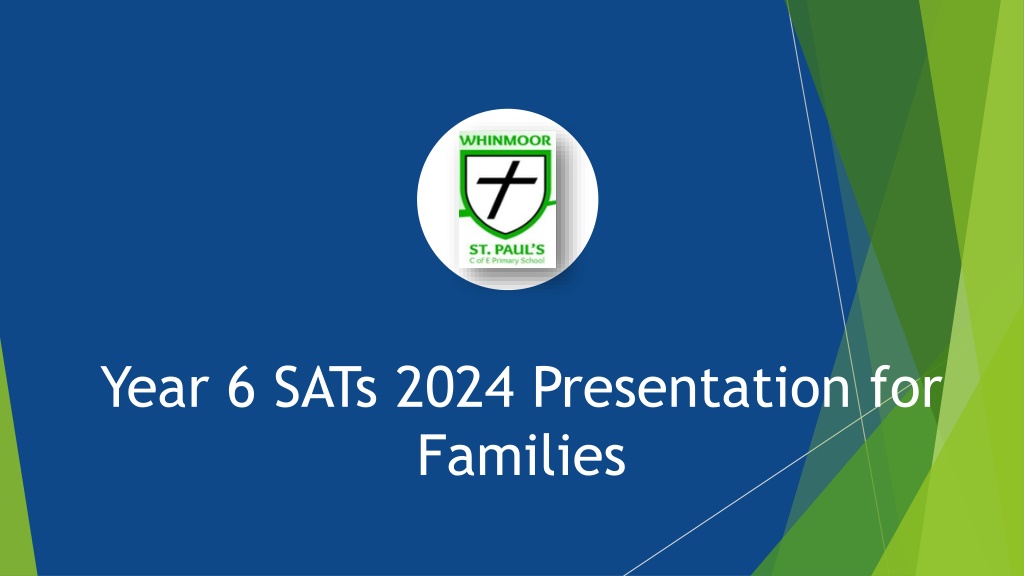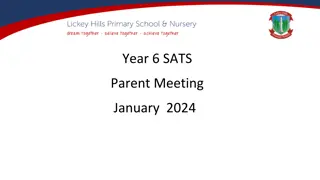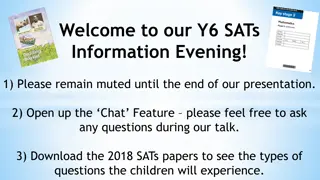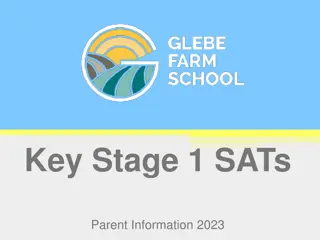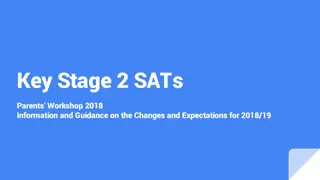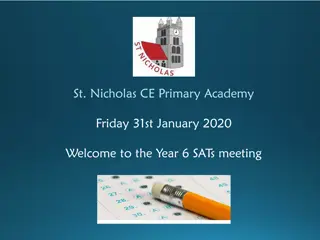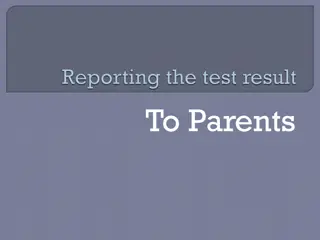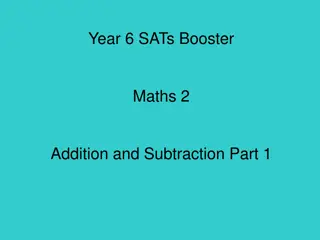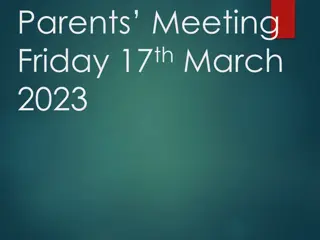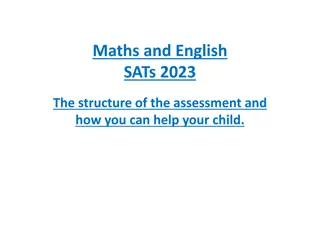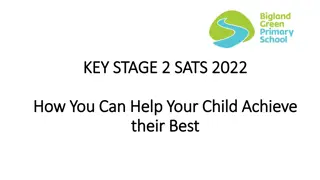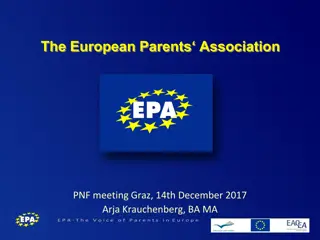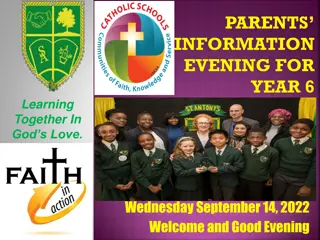Understanding Year 6 SATs in 2024 for Parents
Year 6 SATs in 2024 are Standardised Assessment Tests for Key Stage 2 children. The tests cover Spelling, Punctuation, Grammar, Reading, and Maths over four days. Students must follow strict exam conditions during testing, with results sent to schools in July. Tests are externally marked and scored, allowing comparison of performance over time. Understanding the test structure and content can help parents support their children through this important assessment phase.
Download Presentation

Please find below an Image/Link to download the presentation.
The content on the website is provided AS IS for your information and personal use only. It may not be sold, licensed, or shared on other websites without obtaining consent from the author. Download presentation by click this link. If you encounter any issues during the download, it is possible that the publisher has removed the file from their server.
E N D
Presentation Transcript
Year 6 SATs 2024 Presentation for Families
What are the SATs? SATs are the Standardised Assessment Tests that are given to children at the end of Key Stage 2. The SATs take place over four days, starting on Monday 13thMay ending on Thursday 16thMay. The SATs papers consist of: Spelling, punctuation and grammar (paper 1: Grammar/ Punctuation/ Spelling) Monday 13thMay Spelling, punctuation and grammar (paper 2: Spelling test) Monday 13thMay Reading Tuesday 14thMay Maths (paper 1: Arithmetic) Wednesday 15thMay Maths (paper 2: Reasoning) Wednesday 15thMay Maths (paper 3: Reasoning) Thursday 16thMay Writing is assessed using evidence collected throughout Year 6. There is no Year 6 SATs writing test. The key stage 2 tests will be taken on set dates unless your child is absent, in which case they may be able to take them up to 5 school days afterwards. 2
When and how the SATs are completed The tests take place during normal school hours, under exam conditions. Children are not allowed to talk to each other from the moment the assessments are handed out until they are collected at the end of the test. After the tests are completed, the papers are sent away to be marked externally. The results are then sent to the school in July. Each test lasts no longer than 60 minutes: Spelling, punctuation and grammar (paper 1: Grammar/ Punctuation) 45 minutes Spelling, punctuation and grammar (paper 2: Spelling) 15 minutes Reading 60 minutes Maths (paper 1: Arithmetic) 30 minutes Maths (paper 2: Reasoning) 40 minutes Maths (paper 3: Reasoning) 40 minutes 3
The results Tests are marked externally. Once marked, the tests will be given the following scores: A raw score (total number of marks achieved for each paper); A scaled score (see below); A judgement on if the National Standard has been met. After marking each test, the external marker will convert the raw score to a scaled score. Even though the tests are made to the same standard each year, the questions must be different. This means the difficulty of the tests may vary. Scaled scores ensures an accurate comparison of performance over time. Scaled scores range from 80 to 120. A scaled score of 100 or more shows the pupil is meeting the National Standard. 4
Monday 13th th May May Spelling, Punctuation and Grammar: Monday 13 Spelling, Punctuation and Grammar consists of two papers. Paper 1 focuses on all three elements (spelling, punctuation and grammar). The paper lasts for 45 minutes. Paper 2 consists of a spelling test only. It should take approximately 15 minutes, although this is not a set amount of time (pupils should be given as much time as they need to complete the test). 5
Spelling, Punctuation and Grammar: Paper 1 The children will have been working hard with their class teacher on developing and securing their knowledge of the technical vocabulary needed in this test. This test focuses on: Grammatical terms/ word classes; Functions of sentences; Combining words, phrases and clauses; Verb forms, tenses and consistency; Punctuation; Vocabulary; Standard English and formality. This test requires a range of answer types but does not require longer formal answers. 6
Spelling, Punctuation and Grammar: Paper 1 Example questions: e.g. that, which e.g. The first sentence is about two people and the second sentence is about three 7 people.
Spelling, Punctuation and Grammar: Paper 2 Paper 2 is a shorter paper that focuses solely on 20 spellings. Example questions: 8
Reading: Tuesday 14th May There is one reading test that lasts for 60 minutes. The test is designed to measure if the children s comprehension of age-appropriate reading material meets the national standard. There are three different set texts for children to read. These could be any combination of non-fiction, fiction and/ or poetry. The test covers the following areas: Give/ explain the meaning of words in context; Retrieve and record information/ identify key details from fiction and non-fiction; Summarise main ideas from more than one paragraph; Make inferences from the text/ explain and justify inferences with evidence from the text; Predict what might happen from details stated and implied; Identify/ explain how information/ narrative content is related and contributes to meaning as a whole; Identify/ explain how meaning is enhanced through choice of words and phrases; Make comparisons within the text. 9
Reading The reading SATs paper requires a range of answer styles. Example questions: 10
Reading Example questions: Based on text 2: Fact Sheet: About Bumblebees 11
Maths: Wednesday 15th May and Thursday 16th May The maths assessments consist of three tests. Paper 1: Arithmetic (30 minutes) Wednesday 15th May Paper 2: Reasoning (40 minutes) Wednesday 15th May Paper 3: Reasoning (40 minutes) Thursday 16th May 12
Maths Paper 1 (Arithmetic) The maths arithmetic paper has a total of 40 marks. The test covers the four operations (addition, subtraction, multiplication, division, including order of operations requiring BIDMAS), percentages of amounts and calculating with decimals and fractions. Example question: 13
Maths Paper 1 (Arithmetic) Example questions: 22 87 5.87 + 3.123 8.993 - 65 22 8.993 60 (30 - 24) 60 6 = 10 10% of 3,000 = 300 20% of 3,000 = 600 10 600 14
Maths Papers 2 and 3 (Reasoning) Paper 2 will take place on Wednesday 15th May and paper 3 will take place on Thursday 16th May. These tests have a total of 35 marks each. These papers require children to demonstrate their mathematical knowledge and skills, as well as their ability to solve problems and their mathematical reasoning. They cover a wide range of mathematical topics from key stage 2 including, Number and place value (including Roman numerals); The four operations; Geometry (properties of shape, position and direction); Statistics; Measurement (length, perimeter, mass, volume, time, money); Algebra; Ratio and proportion; Fractions, decimals and percentages. 15
Maths Papers 2 and 3(Reasoning) Example questions: 11 109 2.5 or 2 16
Supporting your child in preparing for the SATs Firstly, a positive attitude goes a long way. Give them as much encouragement and support as you can! Tips: Homework needs to be completed- mathletics, spag.com, maths books etc. Talk to the year 6 team if you have any concerns rather than worry your child. Encourage your child to talk to their teacher or a trusted adult (including yourself) about any concerns or worries. Give your child a quiet, distraction free space to complete homework or study. Give your child time to go outside and reduce screen time. Ensure your child is eating and drinking well and getting a good amount of sleep. Plan something nice and fun for the weekends before and after SATs. This will help them to relax before the SATs and give them something to look forward to after. 17
Advice for Year 6 children Listen to your teacher. The adults you work with all want you to do your best. Get plenty of sleep and eat well, this will help your brain. Read all the questions carefully. This can help you to avoid silly mistakes. Don t panic. There may be questions you think you can t answer. Take a deep breath. Read it again. You can always move on and go back to it later. It s often better to write something rather than nothing. Most importantly remember that the Year 6 SATs last for 4 days out of your whole life! Stay focused in class so you don t have loads of extra studying to do at home! A previous Whinmoor St Paul s Year 7 pupil s advice. 18
